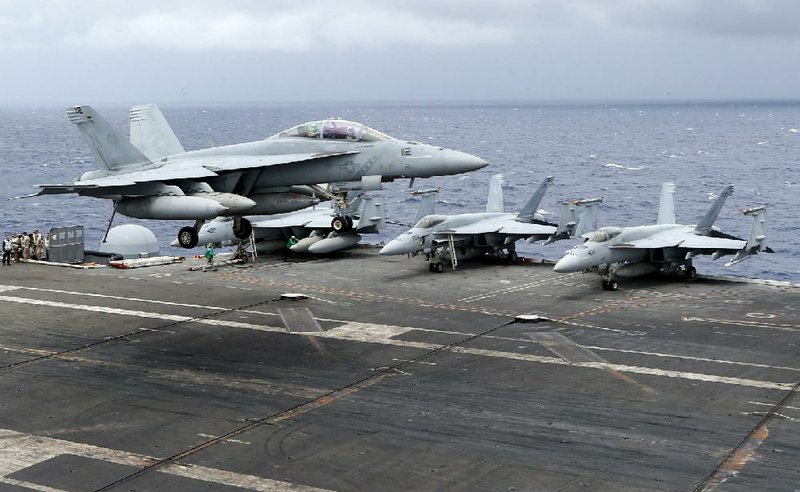BEIJING -- China said Tuesday that it "will not stand idly by" and will take countermeasures if the U.S. deploys intermediate-range missiles in the Asia-Pacific region, which Washington has said it plans to do within months.
The statement from the director of the foreign ministry's Arms Control Department, Fu Cong, comes after the U.S.' withdrawal last week from the Intermediate-Range Nuclear Forces Treaty, a move Fu said would have a "direct negative impact on the global strategic stability" as well as security in Europe and the Asia-Pacific region.
Fu said China was particularly concerned about announced plans to develop and test a land-based intermediate-range missile in the Asia-Pacific "sooner rather than later," in the words of one U.S. official.
"China will not stand idly by and be forced to take countermeasures should the U.S. deploy intermediate-range ground-based missiles [in] this part of the world," Fu told reporters at a specially called briefing.
He also advised other nations, particularly South Korea, Japan and Australia, to "exercise prudence" and not allow the U.S. to deploy such weapons on their territory, saying that would "not serve the national security interests of these countries."
U.S. Defense Secretary Mark Esper said in Asia over the weekend that he wanted to deploy midrange conventional missiles in the Asia-Pacific region within months. Australian officials said Monday that the locations for the bases were not yet known but their country would not be one of them.
But speaking to reporters traveling with him to Tokyo on Tuesday, Esper said it would take "a few years" to achieve initial operation of missiles in the region.
"I have never asked anybody about the deployment of missiles in Asia," he said when asked about his meetings in Australia and New Zealand. "I never asked, they never declined. We are quite some ways away from that."
Asked about potential locations, he said there will be a lot of dialogue between the Pentagon, area military commanders and allies.
Fu also said China had no intention of joining nuclear weapons reduction talks with the U.S. and Russia, pointing to the huge gap in the size of China's arsenal compared with those of the other two. China has an estimated 290 nuclear warheads deployed, compared with 1,600 for Russia and 1,750 for the U.S., according to the Federation of American Scientists.
Russian President Vladimir Putin has called for urgent arms control talks to prevent a chaotic arms race after the treaty's demise. He also said Monday that Russia would only deploy new intermediate-range missiles if the U.S. does.
China has already shown "maximum restraint" in developing its arsenal and stuck to its policy that it would not be the first to use a nuclear weapon in a conflict, Fu said.
"I don't think it is reasonable or even fair to expect China to participate in an arms reduction negotiation at this stage," Fu said. He added that China remained committed to multilateral efforts to reduce nuclear stockpiles, such as the U.N.'s Comprehensive Nuclear-Test-Ban Treaty, although it has yet to ratify that agreement.
Fu wouldn't elaborate on what countermeasures China was considering taking against the U.S., saying only that "everything is on the table," although he did say China has never and would never take part in a nuclear arms race.
Nor would he say how China might retaliate against countries that hosted U.S. land-based intermediate-range missiles, although China has in the past used economic means to retaliate against South Korea over its deployment of a U.S. anti-missile defense system.
Fu dismissed U.S. arguments for leaving the treaty as "pure pretext," saying Washington was merely looking for an excuse to develop new weapons. If Washington truly believes Russia is cheating on the treaty, as it says, then the way forward is to negotiate rather than withdraw, Fu said.
The Intermediate-Range Nuclear Forces Treaty signed by Russia and the U.S. in 1987 expired Friday, with Washington saying it withdrew because of Russia's alleged violations of the pact. Russia denies breaching the terms. Some observers say the real reason was a perceived need to counter China's advances in missile technology and restore a balance in light of lingering questions over the effectiveness of anti-missile defense systems.
The end of the treaty comes amid rising doubts about whether Russia and the U.S. will extend an agreement on long-range nuclear weapons scheduled to expire in 2021 known as New START. Trump said he has been discussing a new agreement to reduce nuclear weapons with China and Russia.
Asked about Trump's comments, Fu said he didn't wish to contradict Trump, but repeated that China "has no interest and, frankly, we don't think we are even in a position to participate in a trilateral negotiation aimed at a nuclear arms reduction."
A Section on 08/07/2019


